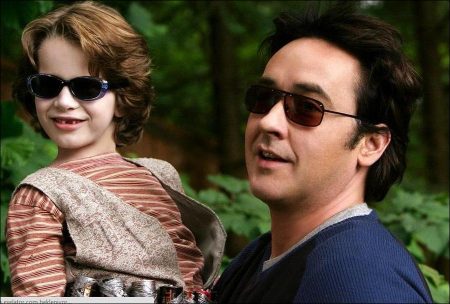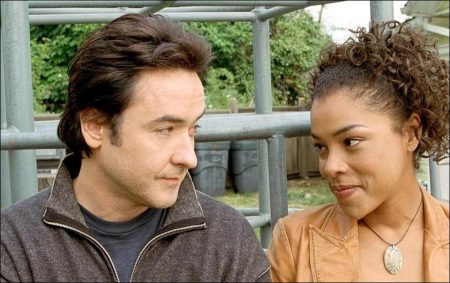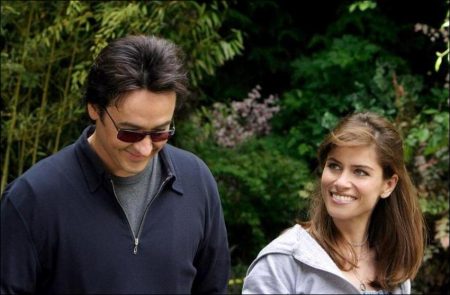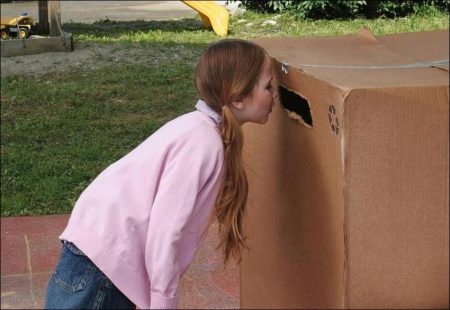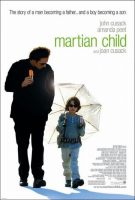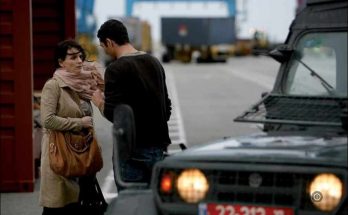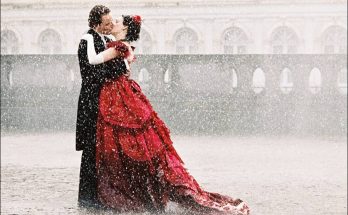Tagline: The story of a man becoming a father… and a boy becoming a son.
In Martian Child, David Gordon (John Cusack), a recently widowed science fiction writer, considers adopting Dennis (Bobby Coleman), a young orphaned boy who claims to be from Mars. Ignoring some sage advice about the perils of parenthood from his sister Liz (Joan Cusack) and the qualms of children’s group home director Sophie (Sophie Okonedo), David decides he wants to be a father to the odd youngster who keeps insisting he is an alien. Even with the support of his friend, Harlee (Amanda Peet), who David finds himself increasingly attracted to, the aspiring dad soon finds himself in way over his head.
For starters, David’s in danger of missing his next publishing deadline, and that has his nervous agent, Jeff (Oliver Platt), worried. And then there is the social worker, Lefkowitz (Richard Schiff), and his review board who also have some serious doubts about David’s suitability as a dad.
In the midst of all this, young Dennis exhibits some pretty strange behavior and adamantly insists that he does indeed come from the red planet. A series of inexplicable events ultimately leads David to wonder whether the boy’s claims are indeed based on fantasy. But whatever the true origins of this remarkable little boy, David gradually finds himself growing more attached to him and experiencing the transformational power of parental love.
About the Production
It was over a decade ago that producers David Kirschner and Corey Sienega were first introduced by producer Ed Elbert (Anna and the King) to David Gerrold’s Hugo and Nebula Award-winning short story The Martian Child. As Kirschner recalls, “Corey read the short story and loved it. She called me and said, `you should read this, this is perfect.’”
As it turned out, The Martian Child was exactly the kind of story that the producers were looking for. “We love projects that deal with the issue of childhood in some manner, as well as those that have an element of fantasy woven through them,” says Kirschner.
For Kirschner, there was also a personal element in this story, which made it particularly appealing. “What was very moving to me when I read the story was the relationship between father and son. I lost my dad when I was very young and so many of the projects that I seem to be attracted to deal with the importance of men in boy’s lives. In this case the story hit all the right buttons in terms of its humor and, more importantly, its emotions.
“We fought for the rights to the story and lost them, but then luckily got them back,” Corey Sienega recalls “And finally, a short ten years later, here we are! This project is a longtime labor of love for David Kirschner and I and it’s very exciting to finally see it come to fruition.”
Kirschner, who also admits to having been somewhat of a loner as a kid, points out that the theme of alienation is something most people can relate to. “Dennis is a kid who doesn’t quite fit in with the norms of what society is supposed to be. I think all of us go through a point in our lives where we’re `Martians.’ We don’t’ fit in, we’re from another planet. Sometimes it’s when you’re a grownup, sometimes it’s when you’re a kid and sometimes it’s every day.”
John Cusack topped the filmmakers’ wish list to play David Gordon from the very beginning and the role was actually tailor-made for him, as Kirschner explains. “The screenwriters, Seth Bass and Jonathan Tolins, tell us that when they wrote it they had John Cusack in mind for the role of David. There’s a real everyman, James Stewart quality to John Cusack, but not an everyman from a Frank Capra movie, an everyman from the world that we live in today – one that’s neurotic, sometimes paranoid, yet humorous and quick-witted.”
“In addition to John’s amazing talents and acting abilities,” Kirschner continues, “his strength for me lies in the fact that he’s almost a brand name for audiences that enjoy his films and that he seems to make really smart choices. It was a big deal for us that he accepted this role because we really didn’t know what he was going to say to the idea of playing a father. It’s not something he had done before, so this was an important milestone in his career, the idea that he was old enough to play a father.
For John Cusack, it was both the nature of the story and the creative opportunities it would afford him as an actor that led to his accepting the role. “I thought it was a story that was dramatic and intriguing while remaining small and interior, from a character point of view,” says Cusack. “It’s about a guy who tries to adopt a boy and they just try to fathom each other and figure each other out. I like that from an acting perspective because it’s more character-driven.”
“I also thought it was a very modern and compelling story about a boy who can’t really fit in and doesn’t know how to integrate himself into the world. I thought it was very interesting, the idea that he thinks he is from another planet, like David Bowie in The Man Who Fell to Earth. It was a metaphor for alienation and not being able to fit in and find your place in the world. In a certain sense both David and Dennis think they are helping each other, but they both really need each other. It was beautiful and dramatic and felt like a very good story.”
It was Cusack who introduced director Menno Meyjes to the project after they had worked together on the acclaimed feature Max, which was Meyjes’ directorial debut. The producers were familiar with Meyjes thanks to his highly-lauded writing career; David Kirschner recalls their first encounter nearly two decades earlier. “I first met Menno, who had long hair down to the lower part of his back, in 1984 when Steven Spielberg introduced us. He had just finished writing The Color Purple and I was just starting An American Tail. Who knew that almost 20 years later we would meet again and he would direct this film?”
Meyjes himself was also drawn by the special appeal of the story and by its tribute to parenthood. “It was a total love story between a child and a man, but also a kind of a poem to parenting, to how difficult it is and how heroic it is, and how people give of themselves selflessly.”
The search to find the perfect child actor to play Dennis sent Los Angeles casting director Mary Gail Artz across North America. From Toronto and New York to Philadelphia, San Francisco and Seattle, literally thousands of audition tapes were collected.
“It was an incredible undertaking,” recalls producer Corey Sienega, “but also probably the scariest part of putting this movie together. For years we’d been dreaming about it. We developed the script, we were lucky enough to get John Cusack, we got the green light, and then suddenly we realize that this all hinges on whether or not we can find this incredibly unique kid to play opposite John Cusack, to be in nearly every frame of the movie with him.”
When Bobby Coleman walked in, the filmmakers knew that their search was over. “Bobby had something that was very special, unique and complete,” Sienega recounts. “We all said `wow, he’s not acting, he just is this whole person.’”
“There was a personality, there was a life” David Kirschner agrees. “This wasn’t one of those kids who are so manufactured by Hollywood. I’m not one of those people that use the term `old soul;’ I’m honestly kind of embarrassed by it. But it really applies to Bobby. He brought an intuition and an understanding of character that was incomprehensible. When he sat down and had a discussion with Menno Meyjes it was like two adults speaking. It’s like someone who has lived a life of an additional 30 years aside from the ten that he’s lived now.”
Certainly Meyjes had no doubts about the young actor’s suitability for the role. “I knew Bobby was the Martian Child the moment he walked in the door,” he recalls. “And what Bobby had was that he didn’t need to be loved. My idea about the character of Dennis, the Martian Child, had been that he was difficult to love at times. Bobby gave me that in a most charming, most mysterious way. He wasn’t wearing any shoes. He was wearing these jeans with holes in them and he brought this plastic baggie in with him because the character collects stuff and puts it in plastic baggies. From the moment I saw him I thought `this is my guy.’”
Once John Cusack was attached to the film, he became the catalyst in attracting a strong supporting cast, including Amanda Peet, who had worked with him previously in the hit mystery thriller Identity.
“I came into Identity having just this huge crush on John from being a teenager and seeing him in Say Anything, recalls Peet. “It took me awhile before I could just have a normal conversation with him and think him about as an actor and as a person because I was so obsessed with his movies.”
The combination of Cusack and the story itself proved to be an irresistible draw for the young actress. “I loved the whole redemptive element of the movie because John Cusack’s character feels like an outsider at the beginning and then he is able to shepherd this child. I just thought it was beautiful.”
Peet goes on to draw a comparison between the film’s theme of alienation and young rebellion. “I think that adolescents sometimes concretize their feelings of being alienated by going through some kind of fad like wearing all punk clothes or joining some kind of clique or finding some way to make their alienation official.”
John Cusack, who has worked with his sister Joan on eight previous feature films, naturally thought of his talented sibling to play the part of his sister in Martian Child. As far as Cusack is concerned, the idea of casting Joan was definitely a no-brainer.
“I’m just being smart because whenever she comes on screen she knocks it out of the park. She’s a great actress and comedian, so if I’m making a movie and I can get her to be in it, I’m just lucky to have her. And this time it seemed like a perfect fit.”
Coming from a show business family, with his father, brother and three sisters all actors, Cusack reserves the highest accolades for his sister, Joan. “I think she’s probably the most purely talented member of our family. She can be dramatic or strangely hilarious at the drop of a dime and in a way that nobody else can. She approaches things from odd angles. And I think she just opens up some channel and then can basically do anything. My philosophy with her is if you do a scene with her you just get out of her way and try not to get run over. And then hopefully you’ll ride her coattails.”
For her part, his sister admits that she loves working with John because she has the greatest respect for the type of films he chooses to work on. “I think making movies is hard, and getting a movie made is really hard, as is coming up with more complex themes. John really tries to aim high about making the best kind of movie he can think of or be in. He works really hard to get a special kind of movie made.”
Joan Cusack’s take on the central theme of the story is typically direct and succinct. “Life is pretty crazy and can be weird and it could be that we all are from Mars sometimes. But in the end it’s about relationships and how you handle things and how you work through things and who you’re committed to and how you accept people for what they are.”
John Cusack sums up the eagerness with which the other cast members signed on to the film. “When the other actors had seen Menno’s film, Max, they knew they were dealing with a talented director. And then I’d known some of them and I think it was a combination of all those elements that probably made it an attractive thing. I think we got a great group of really serious actors to do this movie; it attracted a lot of great talent. It’s a pretty terrific cast.”
Another good friend of both Cusacks is Oliver Platt, who had worked with John in The Ice Harvest and with Joan in Working Girl. “Oliver Platt has three kids and he just said he loved the fatherhood aspect of the movie and wanted to be a part of it. He also thought it would be fun to work with me again,” John Cusack recalls.
Sophie Okonedo, an Oscar nominee for Hotel Rwanda who plays the role of a children’s home director, readily admits that Cusack’s involvement was the main attraction for her as well. “I was a fan of John’s already. It’s one of the reasons I wanted to do the job, to get to work with him.”
For Richard Schiff (“The West Wing”), who had also worked with Cusack previously, his faith in the actor’s unique tastes and talents played a significant part in his decision to do the film.
“John and I had worked together before years ago in City Hall and we had a great time. I have always respected him as an actor. He really brings some life to the material, has a specific point of view and is a good guy. And that is not an everyday combination.”
Schiff also had another, more personal, reason for wanting to do the film. “I liked the story a lot because I have a child named Gus who’s about the same age as Dennis and who’s very special in a lot of ways. He too is different. And I certainly felt that way myself as a kid. This movie is kind of one big metaphor for all of us who as kids felt a little bit different. Dennis takes it to an extreme, but at times we all felt that way. We all felt like we were from Mars, those of us who were not the center of the pack.”
The filmmakers decided to take an unusual approach to the filming process, in deference to the character-driven nature of the story and the fact that this was the first major starring role for young Bobby Coleman. The decision was made to actually film the scenes, as much as possible, in the actual chronological order of the script, in what can best be described as a theatrical approach.
“At Menno’s suggestion, we set out from the beginning to try and create a live theatre environment every day,” says producer Corey Sienega.
This approach was particularly useful in allowing John Cusack to develop his characters’ relationship with that of Bobby in a natural progression. In the story, it takes some time for the alienated child, Dennis, to begin to trust in his aspiring adoptive dad. In order to mirror this process, Cusack kept his distance from young Coleman during the early weeks of filming, when they were off camera.
“I wanted to sort of discover the relationship on camera and work with him,” Cusack explains. “And I also wanted him to develop his own relationship with Menno, and his character. So much of the film is these two people just kind of trying to share the same space and communicate. So I didn’t want to become too close with him too quickly. I just wanted to let it develop naturally.”
It’s a process that Bobby Coleman, with remarkable perception for someone so young, understood and appreciated immediately. “Because John said he wasn’t going to play with me so much in the beginning, we would be sort of nervous with each other. And then he would get more and more playful at the end. And that really helped me out.”
Bobby’s innate grasp of his character and instinctive understanding of the acting process was immediately apparent to both the filmmakers and crew. During the very first week of filming the scenes where David visits Dennis, sitting in his cardboard box at the group home, Bobby started to give director Meyjes some notes. Much to the amusement of Cusack, the filmmakers and crew, Bobby piped up, just before the 2nd take of the scene, “Menno, next time don’t say `cut’ so soon because there’s something John and I want to do.” His watching parents were a little taken aback at this audacity, but it was soon apparent that their son simply had very good acting instincts.
As the filming continued, it was increasingly evident that the neophyte star had very impressive innate acting abilities. “Bobby is the most natural actor I’ve ever observed,” says Meyjes. “He is just a born actor. We would all sit there during dailies and laugh ourselves silly because before takes he would be acting up just like a little Tasmanian devil. And then I would say `action’ and he would just close down instantly and become Dennis. It was fantastic!”
John Cusack is equally enthusiastic about his young co-star. “He’s got amazing instincts and very specific points of view and really was the custodian of his character, much more than I was. I tend to listen to pick things up and then I’ll try to figure out what I want to do. But Bobby came in with very specific opinions; Dennis would do this, he wouldn’t do that. I think Bobby is a guy who just always knew how to act and you can’t really teach that kind of subtlety.”
Cusack goes on to describe Bobby’s instinctive grasp of his character’s psychological make-up and his decision not to play the role in a self consciously cute way. “I think a trap he could have fallen into would have been to really do an overly sentimental version of his character. But Bobby wasn’t interested in being loved. He was interested in finding out what the truth was for Dennis. He’s definitely a fragile character, but he’s got a little Jimmy Cagney in him. He has strength to him that I think is very compelling, and watchfulness. He’s an actor who can be completely still in front of the camera and not do anything and kind of let the camera come to him. Very sophisticated things. So he’s a gifted guy and he’s got great parents.”
When Bobby was not in front of the camera, he easily captured the affections of the cast and crew with his joyful and engaging manner. In this respect he was a lot like any other child, proud of having lost his front tooth just before the start of filming, insatiably curious about everything around him. At the same time, his unusual intelligence would shine through.
Producer Corey Sienega describes how the experience of working with the young actor in some ways mirrored the story of the film. “I think everybody on our crew really felt like they were part of raising Dennis, this little Martian boy. Everyone sort of took him under his or her wing and he was interested in everything. He just had a million questions and brought such wonderful energy to the set. At the same time he seemed to come up with a lot of little philosophical kind of statements that caught everyone off guard. For instance, his comment about Joan Cusack playing the role of John’s sister in the film is a good example. He said to John, `when your sister comes next week and you say `hey sis,’ will she think you’re saying it as her real brother or will she think that you’re playing the character?’ He’s a very deep little kid.”
Joan Cusack, herself a mother of two young boys, is also taken with young Coleman’s natural abilities. “Bobby’s a great kid. I think children in general are magnificent and magical, the way they look at the world. He’s been able to come up with this character and inhabit it, which I think kids are so good at doing. And he’s good because he’s really able to articulate it and he has great confidence in it.’
Although John Cusack had no previous experience of portraying a father on screen, he has had practice at being an uncle and has a natural affinity for kids, as his sister Joan attests. “I think a huge key to the personality and puzzle of John is how much he loves kids and finds them enormously amusing and fantastic. I’ve seen that side of him so much in my whole life and he’s that way with my own kids. It’s just great!
John Cusack explains that his character, David, who is himself something of an eccentric loner, is drawn to adopt little Dennis because he sees in him a reflection of his own younger self. “I think he sees something of himself when he was a kid, someone who at an early age is escaping into his fantasy life as a survival technique. Like a lot of other people he probably projects different things onto him and thinks that if he can save him, he can save himself. Dennis is one of these kids that nobody’s probably going to take because he’s a kid with special needs who’s got some real problems. So David decides if he loves him enough that he can get him to let go of this Martian fantasy and join the human race. But Dennis doesn’t have any plans on letting go of that fantasy.”
What it brings up for Cusack’s character is also what might be described as the central dilemma of parenthood, as seen from his personal perspective. “On one level David’s got to socialize the kid and integrate him to the world,” says Cusack. “But on the other level he’s got to let the kid be who he is. And that’s kind of the ultimate thing that most parents try to do. I’ve seen that in my relationship with my parents and watching my sister with her kids and my friends with their kids. It’s kind of like an art form. How much do you make them kind of conform to the world and how much do you let them be who they are? And I don’t think there’s an easy answer to it. People who think there’s an easy answer probably don’t have to raise a kid. So I think David’s always struggling with that, just trying to find that balance.”
In David’s struggle to conquer the uncertainties and challenges involved with his instant fatherhood, he receives the most unqualified support from his late wife’s friend, Harlee. Amanda Peet describes her character’s perspective on the situation as well as her role in David’s life.
“I’m the voice of his wife who passed away,” Peet explains, “her positive voice and this voice of reassurance. It would be nice when we lose someone if we could have somebody around to give permission because when you have survivor’s guilt you probably think you can’t go on. You think you can’t find happiness and you probably feel like the things that you would touch might break again because things have broken for you. Harlee lets him know that it will be okay, that he can open his heart again and have this joy. I like her. I think she has great spirit.”
With regard to Harlee’s take on the strange little boy that her friend has decided to adopt, Peet says, “Amanda thinks it’s okay that Dennis is weird, that it’s good to be unique. She’s an optimist who thinks right now he has to be in a box and right now he has to hang upside down. But, you know, so what?”
In contrast to Harlee’s attitude, Joan Cusack’s character, Liz, has some serious reservations about David’s desire to adopt the peculiar little boy. “Liz is a concerned loving sister, which I can identify with,” Cusack explains. “But she thinks maybe he should have a family and have a life first before adopting this child. And he’s been through this tragedy and maybe this isn’t the right time to do this. If you’re looking for meaning in your life, having children is a great way, but it also calls for great commitment and sacrifice. I think children add enormously to life, so it’s not a sacrifice that way. But it’s not all about you anymore. So she’s more concerned about whether he’s ready for that.
Bobby Coleman has his own unique interpretation of his character’s assignment on this planet, as well as the challenges involved. “Dennis’ mission is to figure out what human beings do on earth,” says Bobby. “He thinks life on earth is a little hard. It’s really hard for him to live and all the human beings in the group home push him around. He has mean kids around him but he doesn’t know they’re mean because he thinks they’re just being normal. And they pretty much are because everyone’s mean sometimes.”
“The reason he lives in a box is because he’s afraid of the sun,” Coleman continues. “It’s weird that he is. And he wears globs and globs of sunscreen after he meets David because David gives it to him. And he has a problem with gravity. He wears this weight belt all the time so he doesn’t float away. And that’s really wrong because earth has much more gravity than Mars. But that’s the way they wrote it.”
Sophie Okonedo, in the role of the group home director who brings David together with the little Martian boy, was also taken with young Coleman’s acting acumen. “Bobby is just absolutely fantastic!” Okonedo enthuses. “It’s extraordinary because often child actors can find it difficult to take direction. And Bobby is phenomenal. The first day we did a shot with him I said to John, `well we should just give up and go home shouldn’t we because this is just a little genius actor.’”
Okonedo also has great praise for the novice actor’s improvisational skills. “You could improvise and he would just come back at you, which is very hard. We actually did it differently in every shot so he was really thinking about what he was saying. He was totally involved and engaged in the test. He’s incredibly bright!”
Producer David Kirschner gives considerable credit to John Cusack’s role in helping Bobby Coleman to develop his acting skills. “I honestly think being around John was incredibly influential,” says Kirschner. “Being around John and listening to him, he was just able to internalize and then bring forth emotions in his character. So many times I would just sit in the front of the monitor with chills running down my arms.”
As the filming progressed it was evident that a very warm camaraderie existed between all of the principal cast members. Thanks to previous friendships and working relationships with John Cusack, it was a very positive experience for all concerned.
Amanda Peet, delighted to be working with John Cusack again, reflects on the experience. “I just love working with John. I think he’s brilliant. He’s a real actor’s actor and he’s really generous. And he’s very playful and likes to be spontaneous all the time, which is fun. He doesn’t get too orchestrated with everything and we have a really good time.”
As for the “Martian Child” himself, Bobby Coleman is equally enthusiastic about his famous co-star and what he has learned from working with Cusack. “Meeting John was great,” says Bobby. “He was so fun to work with. I loved how he molded the scene together. Like, if I made a little mistake and said it wrong or something he would make a reaction that made me look better. He made me look good. He molded the scene together and that’s really cool.”
Director Menno Meyjes describes the evolving on set relationship between John Cusack and Bobby Coleman, as well as the unexpected results. “It was really a revelation to see John’s growing affection and respect for Bobby as an actor. Then he started doing in the moment stuff with Bobby that was really amazing. They began to invent together on camera and it was fantastic.”
Producer Corey Sienega was also deeply affected by the experience of watching Cusack and Coleman creating the magic of the story together. “It was fascinating to watch John and Bobby work together,” Sienega recalls. “John is somebody who is very much seeking the truth all the time as an actor. We’ve never worked with anyone more determined to find that truth. And I think the most incredible thing about Bobby is that he wasn’t capable of being anything but completely truthful. John respected that and recognized that in him. They really trusted each other as peers and they experimented in the scenes together. Bobby just seemed to be completely comfortable searching within a scene and playing off of John. And he certainly stood up to him, he was not intimidated. Bobby and John were very much equals on the set and it was wonderful to see.”
Cusack goes on to give an intriguing example of Bobby’s surprising confidence in his own acting instincts. “In one scene Bobby is supposed to walk up to me in the kitchen while I’m making breakfast for him, according to the script. So during the rehearsal everybody clears out and I’m making the sandwich by the kitchen counter and expecting Bobby to come by, but he walks right in the door and never looks at me and goes and sits down at the opposite end of the room. So we laugh and we say, `okay I guess that’s what we’re shooting!’”
“And we go `Bobby don’t you think Dennis would come over and kind of say hello to David in the morning?’ He goes `no, I don’t think Dennis would do that. Nope.’ He had very strong opinions about what Dennis would or wouldn’t do. So it was great.”
The contrast between Bobby and his character is also remarkably dramatic, as Cusack observes. “Bobby’s very loose and he’s a fun guy. But when he became Dennis he became this very contained kind of being and had this incredible stillness. Sometimes you had to remember he is so young.”
An important part of the intense creative process on set was of course the approach taken by its director Menno Meyjes. John Cusack acknowledges Meyjes for his ability to allow Bobby Coleman to form the development of his character and to trust the young actor’s instincts.
“Menno is an evolved enough director and artist and person to know that people’s instincts mean something,” says Cusack. “He’s not interested in any sort of conventional filmmaking; he really wants to let it all stem from the actors. I think he really listened to Bobby’s instincts. In a sense we were just getting out of the way and letting Bobby tell us what Dennis did and didn’t do. I think probably the smart thing is that we treated him as an adult and a kind of co-partner.”
“What I enjoy so much about Menno as a director is that he is an amazing observer of life and the interaction of relationships,” adds producer David Kirschner. “He brought some really touching, beautiful moments to this film that no one had ever dreamed of before. He brought it to another level of depth and intelligence and humor.”
Dennis may be just an alienated orphan who claims to be from Mars, but on the other hand, he seems to have some uncanny abilities. The ambiguity of the child’s true nature was interpreted in various ways by the filmmakers and cast and in fact occasioned some good-natured debates during the course of filming.
John Cusack has his own interpretation of the mystery at the core of the story. He begins by describing how this aspect of the story develops in terms of his and Bobby’s characters. He is referring to the little boy’s seeming ability to `taste’ colors, to use his “Martian Wishes” to change traffic lights and to affect the outcome of a baseball game, among other things.
“The more time David spends with Dennis, the more he sees how committed Dennis is to this mission he has to document human existence on earth,” Cusack explains. “He says he’s from Mars and there are all these rituals he goes through and none of it really makes any sense, but it’s a really detailed system that he’s worked out. And then as the film goes on he starts to do some strange things or have some sort of unusual insights into things that are just on the borderline of being a parlor trick or possibly being other- worldly. It’s just strange enough where David feels like he might be going a little crazy.”
“The film sort of postulates that the kid could be from a different universe – maybe, maybe not. But none of the adults in the film actually ever take it seriously or deal with it. They think of it as more of a metaphor for kind of alienation. But there is that sort of outside dark horse possibility that maybe he’s telling the truth.”
Producer David Kirschner also agrees with the ambiguity of the child’s origins. “There’s an art to the emotions of the character of Dennis,” Kirschner recounts. “When the audience sees this kid for the first time, John Cusack has brought him a gift of sunscreen and then a pair of sunglasses. And he’s got a little weight belt on and he’s got kind of punk-like thick-soled shoes and there’s something very humorous about it because we don’t understand. But as the story progresses we begin to feel really bad for this kid. It seems very sad that this character feels that he will float away if he doesn’t have this weight belt and that the sun will penetrate his skin if he doesn’t have this almost kabuki like sunscreen on,” Kirschner adds “And yet as it progresses you begin to wonder to yourself, my god, could he possibly be from another world?’”
Director Menno Meyjes appears to welcome the unresolved nature of this conundrum. “There are things about Dennis which are inexplicable,” Meyjes states. “And even though we made a more realistic film than might have been expected from the script, there are still things he does that are inexplicable. But it doesn’t really matter because his way of navigating the world is to be from Mars, which in the end turns out to be a possibly legitimate one.”
Producer Corey Sienega agrees with this assessment and underlines the fact that the ultimate theme of the film is about love and acceptance rather than the reality of the child’s outlandish claim. “In the end David realizes that whatever or whoever Dennis is, he’s his son – Martian or not, it doesn’t matter. So that big question that we’re struggling with throughout the movie becomes irrelevant. So that it’s about accepting this boy for whatever he is and taking this great leap of faith to say `I love you, whatever you are.’”
Towards the end of the filming process some exceptional visitors came to the set, much to the delight of the cast and crew. Both David Gerrold, the acclaimed science fiction author and writer of the original award-winning short story which inspired the Martian Child script, and his adopted son Sean came to meet cast members and observe some of the filming.
It was a very emotional moment for Gerrold and Sean, as they were able to see the story partly based upon their relationship interpreted for the big screen. After a discussion with John Cusack about some of the differences between the real life story and the film version, Gerrold exclaimed, “You know, I don’t care about the details, you guys got the heart and soul of it. The important thing is the relationship.”
As he watched the scene where David comes in to find the diminutive Dennis all alone against the giant backdrop of the Martian set in the museum, Gerrold found himself extremely moved.
“It literally did bring tears to my eyes because I could see the relationship, the love that this man has for this son he’s adopted. It was a very powerful moment,” says Gerrold.
Because the story was character-driven, the main focus of the sets was to support the development of the relationship between David and Dennis.
Filmed mostly on location in Vancouver, British Columbia, the challenge was to find buildings that complemented the nature of the lead characters. The slightly introverted science fiction writer David lived in a house that was all sharp angles and corners, a kind of modern box surrounded by very dense vegetation. This echoed the theme which evolved from Dennis protecting himself by sitting in a cardboard box. When Dennis comes to stay with David, even the walls of his room were deliberately painted the color of cardboard.
It’s important to note that these kind of thematic touches were all very subtle, as production designer Hugo Luczyc-Wyhowski explains in discussing the film’s central theme.
“Alienation is a funny thing – the most powerful alienation can be found in the most normal aspects of day to day life. One of the things that was important in the film was to not show patronizing images of alienation but to show it through the reality of someone feeling alienated in that environment without it looking like a cliché. It’s a film that’s about performance between these two characters, so it’s a film where the design has to support the relationship totally. It’s not a film where the design needs to be shrieking out at you.”
The fact that the film was shot in Vancouver also played a significant part in helping to illustrate the ambiguity at the core of the story, as Luczyc-Wyhowski explains. “It helped that the film was not shot in Los Angeles because there is a degree of polarization that took place in Vancouver which helped the whole process. Had this film been shot in L.A., both the light and the tone would have been quite different. I think it has a more ambiguous tone, which I like because it’s an important aspect of the film.”
One of the film’s most impressive sets was, fittingly, the Mars exhibit at the Observatory where David takes Dennis to visit. It is against the backdrop of giant photographs of Mars, standing entirely dwarfed on the desolate rocky surface of the red planet, that little Dennis meets the reality of his imaginary `home.’
The production company was aided by NASA in creating this set, who contributed the film images of Mars which were continuously running on a number of large screens as well as an actual model of the famed space rover. The film’s design team also created enormous posters based on actual photographs taken from the planet’s surface.
As the last days of filming drew to a close, the actors and filmmakers shared their hopes for the kind of impact the film might have on audiences. “I hope they’re going to be entertained and I hope they’re going to come out thinking that fathers and mothers are everyday heroes,” John Cusack exclaims. “And this kind of dance that we do with each other, with parents and sons and daughters is really where all the drama of life comes from. Maybe it will make parenting seem intense and hip. That would be good.”
Bobby Coleman has his own astute observations about the film’s potential effect. “I’m hoping the audience will see how Dennis and David have sort of been the same when they were growing up. And I’m hoping they’ll see how they kind of grow closer and closer together. And then sometimes they’ll get in a fight and grow out a little bit and then they’ll finally make it together and all of it will be happy. I’m hoping they’ll see that.”
His director couldn’t agree more. “I hope that people will feel uplifted,” says Menno Meyjes. “I think that people will feel better than they walked in.”
Producer Corey Sienega chimes in with her hopes about the film being recognized as a celebration of parenthood. “I think we want this movie to leave people feeling like it’s a love letter to parents for the struggle of getting through it and doing their best. We want people to feel proud of themselves for doing a good job and doing their best, we want this movie to celebrate families.”
It seems appropriate that David Gerrold has some final thoughts about the sobering reality of the story that is part of his life and also reflects the lives of many children in America.
“The numbers are scary,” Gerrold states. “There’s a half million kids in the foster care system. And 100,000 of them – that’s a small town – 100,000 of them are never going to be adopted. That’s because there’s a critical shortage of qualified adoptive parents who are willing to take on the challenge of a special needs child. A kid who’s been abused, who is emotionally disturbed, who’s hyperactive; who might be HIV positive. But these kids need loving, the person inside them is hungry and desperate to be loved.
So my big wish for the movie is that it’s going to get the kids out of the group homes and into families where there’s somebody who’s going to tuck them in at night and hug them and read them a story and tell them how much they love them. No kid should ever grow up without a mom or a dad.”
Martian Child (2007)
Directed by: Menno Meyjes
Starring: John Cusack, Bobby Coleman, Amanda Peet, Sophia Okonedo, Joan Cusack, Oliver Platt, Taya Calicetto, Braxton Bonneville, Zak Ludwig, Samuel Charles, Richard Schiff
Screenplay by: Seth Bass, David Gerrold
Production Design by: Hugo Luczyc-Wyhowski
Görüntü Yönetmeni Robert D. Yeoman
Costume Design by: Michael Dennison
Set Decoration by: Andrea French
Art Direction by: Gwendolyn Margetson
Music by: Aaron Zigman
MPAA Rating: PG for thematic elements and mild language.
Distributed byı Stüdyo New Line Cinema
Release Date: November 2, 2007
Views: 79
